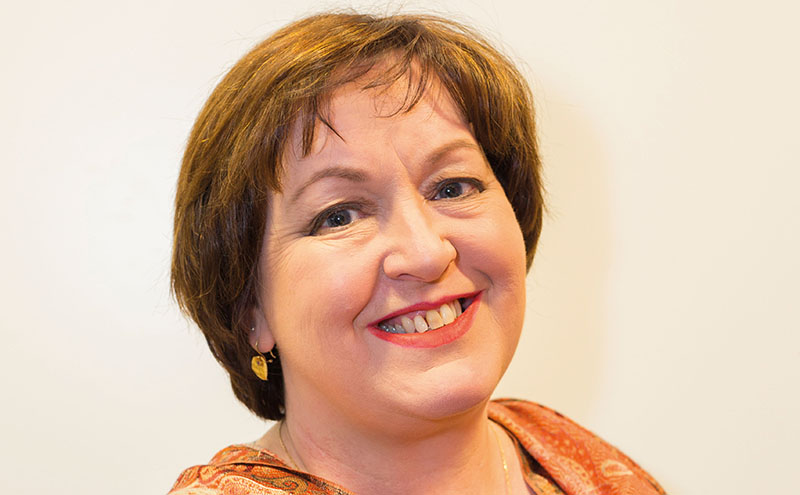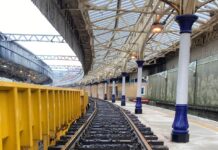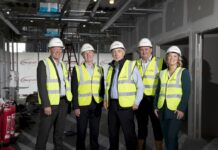
THE combination of Brexit and an ambitious national infrastructure programme is set to present a major health and safety challenge to the construction industry.
That’s the view of Lesley McLeod, CEO of the Association for Project Safety (APS), who has warned that if there is a push to build things quickly, there is a danger that workers could be exposed to greater risks.
Speaking to Project Scotland about what she sees as the biggest issues facing the sector at present, Lesley said, “There are two key issues. There’s the big political stuff around Brexit, which is going to lead to a potential skills gap and a need for staff.
“Aside from that, there’s this whole national infrastructure drive to build new homes, build office space, roads, hospitals, railways, which has the momentum to build a lot of things – and build a lot of things fast.
“Those two issues coming together present quite a health and safety challenge because, while our members are absolutely dedicated to making sure things get built and they get built fast, there’s a risk that the faster you do it you can take your eye off the ball with construction workers finding themselves in the position where their working environment is either less safe or more prone to long-term health ill effects.”
Lesley said that, with the number of homes the UK is committed to building by 2020 working out at around 500 completions per week, it’s a big challenge by anybody’s book.
As well as the potential implications for on-site accidents, Lesley also warned about the “hidden” problems around long-term health effects such as industrial deafness and issues associated with silica dust.
“There’s a whole load of those long-term health problems which you might not see immediately but which might potentially arise in the rush to complete a lot of the building work that needs to be done in terms of national infrastructure,” she explained. “It’s not that we think it can’t be done; it’s just that you need at the design stage to make sure that health and safety don’t get overlooked in the rush to get the actual building up and running.”
One aspect APS is focused on at the moment is highlighting mental health issues among construction workers – something Lesley believes could become an even greater problem if people feel under pressure to deliver projects more quickly.
“If you are under considerable stress at work, what kind of toll does that place on the actual workers themselves?” Lesley asked. “There’s quite a lot of evidence in different industrial sectors that people who have very little control over the pace and flow of their work are more prone to stress-related problems. So we’ve got to make sure that, as we build things and build things quickly, we are not overlooking the mental health needs of the people in the industry, particularly in an industry where people maybe find it difficult to say to a boss ‘I’m feeling a bit low’ or ‘I’m feeling a bit stressed’ because it’s not easy. In some sectors it’s perhaps a lot easier to admit to feeling stressed. It’s maybe not so easy if you feel that perhaps your workmates might take the mick out of you if you said you were feeling a bit fragile.”
With regards to Brexit, Lesley said one potential problem on the horizon could be the status of EU migrants, with the construction sector currently heavily reliant on these workers.
“We need very much to resolve the issue of migrant workers in the UK and what their position will be as Britain moves to withdraw from the European Union,” she added. “And then if those people have to go home, who fills the gap? If they don’t have to go home, how do you ensure that they can work here and work here legally?
“If we have to fill the skills gap with workers from the domestic market, we need to ensure that those people are adequately skilled and adequately trained, which is why we were pleased to see acknowledgement in the chancellor’s budget last week that there will be more money going in to vocational education for people who don’t want to go down the academic route to try that should help take up the slack that may or may not appear as we move towards withdrawal from Europe.”
Lesley said failure to pay attention to health and address potential problems early on could hit companies in the pocket. “It may be hidden but it’s very real and the costs to industry are very high,” she explained. “If you don’t try to make sure that work doesn’t make people ill, you’re going to pay more down the line with people being off with back trouble or repetitive strain injury or, worse than that, things that could actually kill like problems with your lungs.”
Lesley and the APS team are currently involved in some “outside the box” thinking, including working with games designers on how to use techniques from the gaming industry to help with simulation modeling and how people think about accidents and ill health to identify potential risks.
Despite her concerns, Lesley, who has been in her current role for five months now, has been encouraged by what she’s found so far in the construction industry – particularly in respect of the collaboration going on between different organisations and the diversity in the sector.
“I’ve been very impressed by the dedication of the professionals in the industry, not just APS members,” she said. “It’s a much more diverse industry than I had realised. People see construction very much as the hard hats and hi-vis end of things, but there are huge amounts of career openings for people who are in occupational health or who are maybe looking at design or digital modeling. It would be nice to see in five years time more women in the industry. There are barriers still to be broken down but I’ve been very encouraged to see the diversity in the industry and the increasing understanding that there’s more than one type of person that can contribute in the construction industry. I think we’ve got a job to do yet in highlighting what is available and the different career paths but I think that will come.
“I’ve worked in a number of different sectors and I wouldn’t say that construction was any more reluctant to change than any other. I think that is a human thing;people are reluctant to change generally, particularly if you ’ve been in an area where you’re comfortable and know what you’re doing. I don’t really think that is something that is unique to the construction sector. I think everybody is a little fearful of change but I don’t think this is a sector which is any more resistant to change than any other.”








